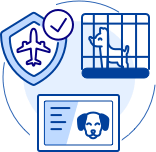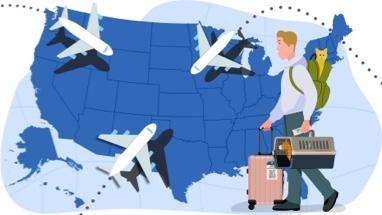Pet Travel From the United States to India
Travel Requirements Based on Pet Type
Carefully read ALL of the requirements related to your pet on this page.
- This page provides the most recent entry requirements and can change without notice.
- It is the responsibility of the veterinarian to make sure the pet has met all health requirements of the destination country before issuing a health certificate.
- Failure to meet the requirements may result in problems gaining certificate endorsement or difficulties upon arrival in the destination country.
- Health certificates must be legible, accurate, and complete.
The requirements for traveling with your pet are described in the health certificate.
A health certificate for dogs or cats can also be generated by the pet's veterinarian through the Veterinary Export Health Certification System (VEHCS). Once the veterinarian logs on to VEHCS and enters the destination country and commodity, VEHCS will walk them through each step to generate the certificate and submit it to APHIS for endorsement.
Note: A printed paper copy of the completed health certificate must accompany each shipment.
Quick Reference Guides for the Pet's Veterinarian
India’s Directorate General of Foreign Trade (DGFT) requires all pets temporarily traveling to India to obtain a DGFT license before obtaining a No Objection Certificate (NOC) and traveling. The form used to apply for the DGFT License is called the ANF-2M. Columns 2(i) & (ii), 3(ii), 4, 5, 7, 8, and 9 must be completed prior to submission of the form to India’s Regional Authorities.
View the application form and details on how to submit it
Note: The DGFT license may take about 1 month for processing.
Pets (dogs and cats) need an NOC document in addition to a valid health certificate. The exporter (pet owner) is responsible for obtaining the NOC from India. APHIS is not involved and does not endorse the NOC.
All pets entering into India must be issued an NOC from the Animal Quarantine and Certification Station (AQCS) in India whether accompanied or manifest, prior to landing into India. People intending on arriving with their pets as accompanied luggage can have an agent apply for this certificate before they enter the country. The NOC can be applied for by mail, fax, or in person.
The NOC document takes about 5 working days to obtain. Documents required prior to obtaining this document are:
- All vaccination records of the pet
- Government-issued veterinary certificate from the exporting country USDA document
- Flight details/confirmation of the passenger's travel into India/copy of the airway bill
Procedural Formalities:
- No Objection Certificate (NOC) issued by the Quarantine Officer at the Animal Quarantine Station in India.
- A duplicate copy of the NOC has to be fixed on the crate of the pet during the air travel.
- Original copy of the NOC has to be produced in India to get the pet released from the customs at the Airport in India.
- On arrival in India, an appointment with the Quarantine Officer for issue of a temporary Health Certificate on examination of the pet.
- Thirty days thereafter, a certificate of health to be obtained from a local veterinarian to be produced at the Animal Quarantine Station. Then, the pet will be issued a permanent certificate of health for their stay in India.
Having an in-country representative is preferred to get an NOC from the Quarantine officer before arrival and per the Department of Animal Husbandry, Dairying & Fisheries (DADF) most of the applicants appoint some in-country representative who works for them. However, if the passenger does not have any contact in India then they can send the original documents via email. In such cases it is recommended to send a copy to DADF & a follow-up phone call is suggested to the specific quarantine station. The DADF stressed that such cases are dealt with on an exceptional basis.
Contact information for AQCS at the different ports can be found by clicking the following links:
On arrival, the Regional Officer/ Quarantine Officer will examine the health of dog/cat, verify the veterinary certificate and vaccination records of imported dog/cat. If the pet(s) is/are free from any clinical illness as well as the documents including veterinary certificate/vaccination records are found in order, the animals imported as pets under accompanied baggage or un-accompanied baggage shall be quarantined for 15 days. If the pet is detected with any signs of clinical illness during quarantine, the period of quarantine may be extended depending on the disease and its severity.
Dogs/cats brought for temporary visits, such as shows, visitors, travelers, therapy, assistance and security purposes, along with masters, shall be exempted from 15 days quarantine period provided the owner of the pet presents required documents:
- passport/pet book/health card of dog,
- passport of owner,
- visa
- return journey ticket,
- health certificate issued by the veterinary authority in the name of owner carrying the dog; and
- proof of purpose of visit.
In such case(s) owner shall furnish the health certificate fulfilling sanitary conditions as above. Also, during the stay in India, the owner shall furnish details of his/her temporary location, phone number etc. so that the quarantine officer may visit the place for verification, if required. The owner of the pet(s) shall be present at the time of entry into India and during his/her return from India at the respective AQCS. This provision is applicable for import up to two pets only. The quarantine officer will prepare a declaration form for this category of animal.
No import of feed or bedding etc. will be allowed along with the dog(s).
For pet travel requirements not listed, APHIS has not been officially informed by the foreign country about the requirements for your pet’s travel. We recommend that you contact a government official of the country you are traveling to for more information.
Country of Destination Contact Information
Countries Participating in the European Union
Austria
Belgium
Bulgaria
Croatia
Cyprus
Czech Republic
Denmark
Estonia
Finland
France
Germany
Greece
Hungary
Republic of Ireland
Italy
Latvia
Lithuania
Luxembourg
Malta
Netherlands
Northern Ireland*
Norway**
Poland
Portugal
Romania
Slovakia
Slovenia
Spain
Sweden
Switzerland**
* Northern Ireland is part of the United Kingdom (UK), but will continue to follow European Union (EU) requirements even though the UK is no longer part of the EU.
** Norway and Switzerland are not part of the EU but have adopted EU legislation for import of most species of live animals.
Need Help?
Still Have Questions?
USDA-Accredited Veterinarians
Contact a USDA-accredited veterinarian for questions about your destination country's entry requirements for pets (including any needed vaccinations, tests, or treatments) and for issuance of health certificates.
Find a USDA-Accredited Veterinarian
USDA Endorsement Offices
Contact your nearest APHIS Veterinary Export Trade Services Endorsement Office for questions about endorsing a health certificate for pets.
Looking for Another Country?
Find your destination country requirements by using the dropdown menu below. If your country is not listed in the menu, visit Pet Travel: Unknown Requirements.




